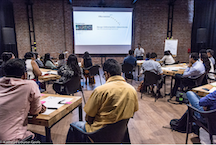Our team members participated in a day-long Digital Identities workshop by Google News Lab in 2018, following which they ran an experiment with modifications to our Janta ki Report programme. This case study describes the success of this experiment in increasing engagement. Originally published here.
Mobile Vaani reaches over 800,000 households across 12 Indian States. They participated in the Digital Identities workshop powered by Google News Lab and received one-to-one support to implement an experiment to increase engagement for their flagship programme Janta Ki Report.
Aug 6, 2018 · 4 min read
Mobile Vaani is a voice-based social network accessible from any phone. It reaches over 800,000 households across 12 Indian states. This includes regions with families living below the poverty line, low-literacy rates and little or no access to the Internet. This project was setup by Gram Vaani, the recipient of a US$200K Knight News Challenge Award in 2008.
Mobile Vaani offers original, episodic content such as their flagship programme Janta Ki Report that covers a wide range of topics — from demonetization to myth-busting rumours like Choti Katne Wali Dayan. Each topic is introduced in a 3–4 minute promo episode. Subsequent episodes are co-created with the audience who respond to the topic by leaving feedback. In the state of Jharkhand, where this platform was first deployed, the system receives more than 3000 calls a day.
‘We work in a very responsive way. The feedback from our listeners decides the direction we take. This process requires intense moderation. We are a team of sixteen, spread across the country and spend up to twelve hours a day reviewing all user-generated content.’ — Paramita Panjal, Programme Director.
Janta Ki Report is reliant on high levels of good-quality engagement with the audience. As the topics can be technical and contentious, sustained listener interest is vital. A team from Gram Vaani, lead by Paramita participated in the 2018 edition of the Digital Identities workshop powered by Google News Initiative. They designed an experiment on inclusive storytelling which they put into action with the help of the one-to-one support after the session.
The team used 5 elements to create a new, inclusive narrative for an episode of Janta Ki Report on Rain Water Harvesting — introduce the topic and immediately establish the scope at an individual or community level; use relatable metaphors to describe the main issue; request participation and set clear boundaries; and finally state the reward for participation.
You can listen to the promo episode (in Hindi) which went out to 300,000 listeners in Bihar, Madhya Pradesh and Jharkhand here and the follow-up episode, which features user-generated content here.
This narrative led to a 43% increase in the number of calls received in response to the promo episode. This is also the first time they’ve received positive and constructive anecdotes from listeners, which has improved the quality of subsequent episodes. The team feel they have developed a closer relationship with their audience and can encourage accountability and action to create hyperlocal impact.
One of the reasons the team feels they’ve succeeded is that they took on the challenge of presenting an important issue at a scale that their listeners can understand — what’s in it for me or for my community. Using relatable metaphors to introduce the issue and then asking for participation also encouraged listeners to contribute.
‘Asking for good practice, solutions and even examples of waste at a local level encouraged our listeners to respond. We also asked people to reflect on their present situation, rather than grand concepts like ideas for future generations.’ — Paramita Panjal
As for the reward.
‘In keeping with the principles of inclusive storytelling, our reward is to shine a spotlight on our audience. We selected the best response to the promo episode and ask the called to introduce the next episode.’ — Paramita Panjal
You can hear the result here.
Encouraged by the response to this sprint, the team will continue to refine their narrative for Janta Ki Report. They are also planning to test this approach on other programmes, such as a new series for the unorganised labour market in Delhi.
‘I don’t see why we can’t use this inclusive narrative to talk about serious issues like financial literacy. In fact, we must work even harder to make these themes accessible to marginalised communities.’ — Paramita Panjal



